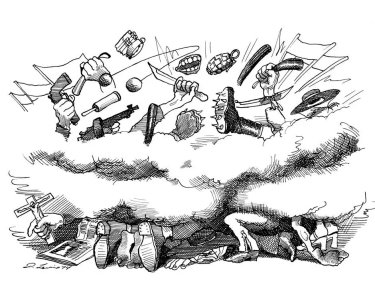A Classic Jim Harrison Story
1968 World Poetry Conference, Jim Harrison, Poetry
Jim Harrison’s mentor at Michigan got him hired as his assistant when he assumed the chairmanship of the English Department at Stony Brook. This led to the goat-footed young Harrison becoming coordinator of the World Poetry Conference.
The gourmand Harrison “spared no expense,” and went enormously over-budget splurging on cold lobster, serious wine, and vodka. The results were impressive to say the least.
One Saturday evening in 1968, the poets battled on Long Island. Drinks spilled into the grass. Punches were flung; some landed. Chilean and French poets stood on a porch and laughed while the Americans brawled. A glass table shattered. Bloody-nosed poets staggered into the coming darkness.
Allen Ginsberg fell to his knees and prayed.
The World Poetry Conference at Stony Brook University was almost over.
Charles Simic, in 2014, remembered:
The biggest and the most illustrious gathering of poets I have ever attended took place in June of 1968 at the Stony Brook World Poetry Conference. There were 108 poets present, according to Jim Harrison, who organized it together with Louis Simpson and others. Most were American, but there was also a sizeable foreign contingent. It was the only attempt in this country, as far as I know, to bring together such a wide range of poets, young and old, from mainstream to avant-garde and those who eluded classification. What that meant for anyone attending the conference was that every poet one admired or hated was likely to be there in person. Fortunately, unless their faces were recognizable from photographs, most could keep their anonymity, since name tags, the kind one may see at vacuum cleaner salesmen’s conventions, were unthinkable at this gathering of the famous and not-so-famous. Still there were tip offs. One could usually guess from someone’s clothes and the length of hair what kind of poetry they fancied, but not always, of course. West Coast poets of all ages by and large dressed more casually than Midwestern and Eastern ones, many of whom could pass for bankers or advertising executives. There were also a few dandies in the crowd, like my friend James Tate, who wore a crumpled white linen suit, as if he had been spending his time in his fashionable haunt on the French Riviera and not Kansas City, where he came from.
The festival started amiably enough with a dinner of fresh lobster, polite introductions all around, and small talk. But as the evening progressed the manners of the participants began to deteriorate somewhat and one could see people whispering in small groups and looking suspiciously over their shoulders. Of course, there was a lot of drinking. Harrison claims he went $50,000 over the budget for food and wine, and I believe him. …
Back at Louis Simpson’s house in Stony Brook, during the farewell party on the last night of the conference, a fight broke out. People were standing in pairs or groups on the huge lawn sipping their drinks and, without any hint that something was about to happen, fists started flying. When a few tried to break it up, a punch would head in their direction and they would in turn join the melee. I stood on the porch watching in astonishment with the Chilean poet Nicanor Parra and the French poet Eugène Guillevic. They were delighted by the spectacle and assumed that this is how American poets always settled their literary quarrels; I tried to tell them that this was the first time I had seen anything like that and it scared the hell out of me, but they just laughed. Looking back, I, too, have to admit that what we saw was pretty funny.
As soon as the fight started, Allen Ginsberg went down on his knees and began chanting some Buddhist prayer for peace and harmony among all living creatures, which not only distracted those fighting, but also startled a few puzzled couples who had discreetly retreated into the bushes during the party and were now returning in a hurry with their clothes in disarray. As for what started the fight in the first place, even the ones who had bloody noses had no idea, though later that night I heard it may have been an insult to someone’s girlfriend or wife that led to a bottle of champagne being broken over their head. Whatever the reason, there was never another meeting of warring poetry tribes to ascertain whether what we witnessed was an explosion of collective animosity or a defense of an unknown woman’s honor.
Jim Harrison clearly was never intended for a career as an academic administrator.






